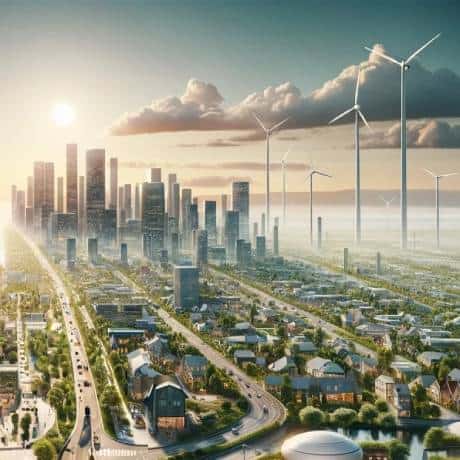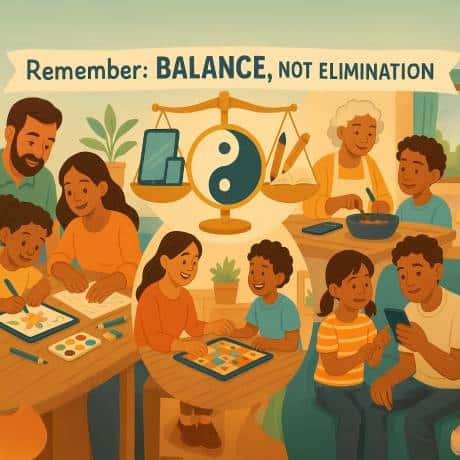The global movement towards achieving Net Zero carbon emissions is gaining momentum, with numerous countries and cities adopting innovative strategies to reduce their carbon footprint and combat climate change. Achieving Net Zero means balancing the amount of greenhouse gases emitted into the atmosphere with an equivalent amount removed or offset, effectively reducing the net emitted to zero. This ambitious goal is critical for limiting global warming to well below 2°C, preferably to 1.5°C, as outlined in the Paris Agreement.
Global strategies for achieving
Net Zero by 2050 include:
- Developing futuristic urban projects like “The Line” in NEOM, focusing on zero-emission, car-free living.
- Initiating C40 Cities, where urban centers commit to aggressive climate action plans.
- Implementing the 15-minute city concept, promoting local living and reduced transportation emissions.
- Enhancing renewable energy use, aiming for a complete transition from fossil fuels.
- Investing in green technologies and infrastructure to support sustainable urban development.
- Fostering international cooperation to share knowledge, technologies, and strategies for reducing global carbon emissions.
The Drive Towards Net Zero
Countries across the globe are setting Net Zero targets, with many aiming to reach this milestone by 2050. The European Union, the United Kingdom, Canada, Japan, South Korea, and the United States are among those that have committed to Net Zero emissions, implementing a mix of policy measures, renewable energy adoption, and technological innovations to achieve this objective.
C40
C40 Cities is a network of mayors from the world’s leading cities, united in addressing climate change by implementing sustainable and effective climate actions. It aims to reduce greenhouse gas emissions and create healthier, more sustainable urban environments. The initiative includes collaboration on projects that promote green jobs, renewable energy, and sustainable urban planning. C40 also focuses on sharing knowledge and best practices among member cities to drive global action towards a greener, more resilient future.
The C40 Cities span continents from North America to Asia, Europe, Africa, and Oceania, collaborate to implement effective climate solutions, share knowledge, and drive global progress toward environmental sustainability. Members include global cities like New York, London, Paris, Tokyo, and Johannesburg, each contributing to the collective effort to reduce greenhouse gas emissions and enhance urban resilience. To check if your city is part of the C40 network, you can visit the ‘Our Cities‘ section on the C40 website.
For more detailed information, please visit C40’s official website.
15-Minute Cities
One urban development concept gaining traction is the “15-minute city”, also known as “20-minute neighbourhoods“. This model aims to create more sustainable and livable cities by ensuring that residents can meet most of their needs within a 15-minute walk or bike ride from their homes. Paris, France, under the leadership of Mayor Anne Hidalgo, is at the forefront of this movement, redeveloping urban spaces to reduce reliance on cars, cut emissions, and improve quality of life. The concept emphasizes local living, reduced transport emissions, and enhanced community interactions.
C40 has partnered with NREP to initiate the Green and Thriving Neighbourhoods programme, focusing on the “15-minute city” concept, which aims for sustainable, equitable, and livable urban areas. This initiative will start pilot projects in at least five cities, supported by an international network of practitioners. The partnership emphasizes compact, efficient urban development to reduce emissions and enhance quality of life, with strategic collaborations including UN-Habitat and Carlos Moreno’s expertise in urban planning.
“The Line” in Saudi Arabia

‘The Line’ is a revolutionary urban development that redefines what cities of the future could look like. Designed as a 170-kilometer-long, 500-meter-tall vertical city that is 200 meters wide, it aims to house 9 million people in a car-free, zero-emission environment powered by 100% renewable energy. With a focus on minimizing the infrastructure footprint, it offers residents access to nature, clean air, and essential services within a five-minute walk. The project embodies a futuristic vision of sustainable, efficient urban living.
‘The Line’ is a pivotal project within NEOM, a planned cross-border city in the Tabuk Province of northwestern Saudi Arabia. NEOM is envisioned as a new model for urban living, a megacity that extends over 26,500 square kilometers, blending smart city technologies with an environmentally sustainable framework. It is part of Saudi Arabia’s Vision 2030 initiative to diversify its economy and reduce its dependence on oil.
‘The Line’s world-leading experts are creating a civilizational revolution by redefining the concept of urban development and the city of the future.’
Earthworks began in October 2021 in Saudi Arabia.
More on ‘The Line’ & NEOM ‘New Future’:
https://www.neom.com/en-us/regions/theline
Challenges and Issues
However, the journey towards Net Zero is fraught with challenges. The shift demands substantial investment in green technologies, infrastructure, and renewable energy sources, which can strain public and private finances. Economic and social inequalities may widen as regions with less financial flexibility struggle to transition.
Moreover, the concept of 15-minute cities, while beneficial for reducing emissions and enhancing urban life, faces criticism over potential increased living costs and gentrification, possibly leading to the displacement of lower-income residents. There is also skepticism about the feasibility of large-scale projects like “The Line,” with concerns about the environmental impact, the use of advanced technologies, and the actual sustainability of such developments.
In conclusion, the global push towards Net Zero is a complex but necessary endeavour involving innovative urban designs like 15-minute cities and futuristic projects like “The Line.” While these initiatives are steps in the right direction, addressing the associated economic, social, and environmental challenges will be crucial to ensure a just and sustainable transition for all.









 Snacks
Snacks Water
Water Eye Sight
Eye Sight Hearing
Hearing





























